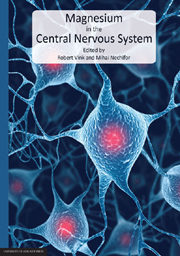Book contents
- Frontmatter
- List of Contributors
- Preface
- Contents
- Section 1 Magnesium in Normal Brain
- Section 2 Magnesium in Neurological Diseases
- Section 3 Involvement of Magnesium in Psychiatric Diseases
- Chapter 18 Magnesium and Alzheimer's disease
- Chapter 19 Magnesium and stress
- Chapter 20 Magnesium in neuroses
- Chapter 21 Magnesium, hyperactivity and autism in children
- Chapter 22 Magnesium in psychoses (schizophrenia, bipolar disorder)
- Chapter 23 Magnesium and major depression
Chapter 23 - Magnesium and major depression
from Section 3 - Involvement of Magnesium in Psychiatric Diseases
Published online by Cambridge University Press: 05 June 2012
- Frontmatter
- List of Contributors
- Preface
- Contents
- Section 1 Magnesium in Normal Brain
- Section 2 Magnesium in Neurological Diseases
- Section 3 Involvement of Magnesium in Psychiatric Diseases
- Chapter 18 Magnesium and Alzheimer's disease
- Chapter 19 Magnesium and stress
- Chapter 20 Magnesium in neuroses
- Chapter 21 Magnesium, hyperactivity and autism in children
- Chapter 22 Magnesium in psychoses (schizophrenia, bipolar disorder)
- Chapter 23 Magnesium and major depression
Summary
Abstract
The treatment of major depression is still a major unmet medical need in the majority of patients. Sixty percent of cases of MD are treatment-resistant depression (TRD), showing that classical treatments for MD are poorly effective to non-effective. Magnesium has been largely removed from processed foods, especially refined grains, in the Western world harming the brain and causing mood disorders. Magnesium deficiency causes N-methyl-D-aspartate (NMDA) coupled calcium channels to be biased towards opening which causes neuronal injury and neurological dysfunction, which we believe results in MD. Oral administration of Mg to animals produced antidepressant-like effects that were comparable to those of antidepressant drugs. Cerebral spinal fluid (CSF) Mg has been found low in suicidal TRD. The first report of Mg treatment for agitated depression was published in 1921 showing success in 220 out of 250 cases. One 2008 randomized clinical trial showed that Mg was as effective as the tricyclic antidepressant imipramine in treating MD. Intravenous and oral Mg protocols have been reported to rapidly terminate MD safely and without side effects. Brain Mg deficiency reduces serotonin levels, and antidepressant drugs have been shown to have the action of raising brain Mg. Excessive calcium, glutamate and aspartate intake can greatly worsen MD. We believe that – when taken together – there is more than sufficient evidence to implicate inadequate dietary Mg as contributing to the cause of MD, and we suggest that physicians prescribe Mg for its prevention and treatment.
- Type
- Chapter
- Information
- Magnesium in the Central Nervous System , pp. 313 - 332Publisher: The University of Adelaide PressPrint publication year: 2011
- 6
- Cited by

